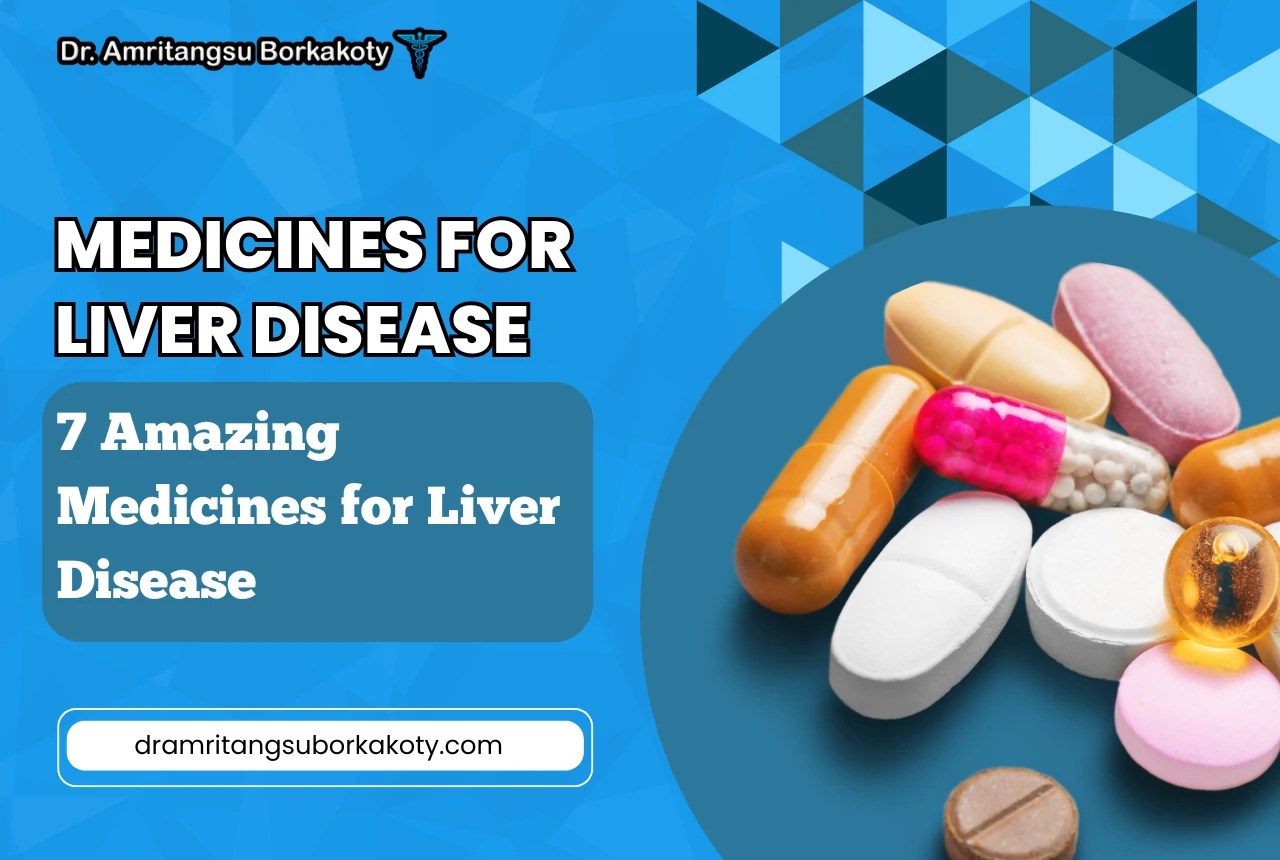
-
 Posted By Dr. Amritangsu Borkakoty
Posted By Dr. Amritangsu Borkakoty -
-
Comments 0
Could liver disease be the next global health crisis?
While being the second-largest global health concern, after HIV infection and acquired immunodeficiency syndrome, global liver disease and its associated liver diseases are rapidly emerging health threats capable of causation of severe morbidity and mortality on a large scale. The incidence of hepatitis, non-alcoholic fatty liver disease (NAFLD), and cirrhosis continues to gradually increase, with NAFLD now affecting more than 30% of the global population.
The management of liver disease is important because immediate intervention may also prevent more severe outcomes, such as liver failure and the possibility of transplantation. Drugs can be an important determinant in treating liver conditions, especially when appropriately balanced with lifestyle modifications like a healthy diet and exercise. This article will explore seven promising medicines for liver disease that have shown potential in clinical studies, offering hope for improved patient outcomes and quality of life.
Understanding Liver Disease and Treatment Options
What Is Liver Disease?
Liver disease basically refers to a condition marked by an abnormality either in the function or structure of the liver. The conditions have been broadly categorized into types:
- Hepatitis: Inflammation of the liver, which is usually caused by viral infections such as A, B, and C or an autoimmune condition.
- Non-Alcoholic Fatty Liver Disease (NAFLD): Excess fat in the liver in the absence of alcohol use that could potentially be progressive to non-alcoholic steatohepatitis, fibrosis, and cirrhosis.
- Cirrhosis- It is a severe scarring of the liver, due to several reasons, such as chronic hepatitis and alcoholism, and sometimes it causes liver failure and complications of portal hypertension.
Advancement of liver disease can severely impair overall health. Early intervention with medications can control symptoms, reduce inflammation, and prevent any further damage from the actual liver disease. For instance, antiviral drugs can suppress the replication of viruses in a patient with hepatitis; for NAFLD/NASH patients, drugs are used to target metabolic pathways.
Medicines for Liver Disease: 7 Amazing Options

Indeed, drugs are significant in the management of liver diseases since they can be targeted directly at the specific underlying mechanisms. For example:
For example, antiviral drugs are currently being used for hepatitis B and C that have significantly reduced inflammation and fibrosis of the liver.
Resmetirom medicines have been shown that it indeed enhance the histology of the liver and therefore reduce the amount of fat accumulation and fibrosis among patients with NASH.
Proper treatment at the right time averts serious complications that include liver failure or even a transplant. Patients who are effectively managed on medication and by lifestyle measures that include maintaining a healthy weight, a balanced diet rich in fruits and vegetables, regular exercise, and abstaining from alcohol seriously improve their liver health and general well-being.
1. Resmetirom (Rezdiffra)
Resmetirom is a newly approved drug by the FDA for the treatment of non-alcoholic steatohepatitis (NASH) with fibrosis. It works as an agonist for thyroid hormone receptors in the liver, leading to the reduction of fat accumulation and inflammation. The clinical results from the MAESTRO-NASH trial are very promising and indicate that this drug can reverse the finding of liver fibrosis.
2. Obeticholic Acid (Ocaliva)
Obeticholic acid is a medication used to treat primary biliary cholangitis (PBC). Its mechanism of action involves an activation of the FXR receptors, thereby decreasing bile acid production and inflammation in the liver. Obeticholic acid has been found to result in improved liver function and prevent cirrhosis progression in patients suffering from PBC.
3. Ursodeoxycholic Acid (UDCA)
Ursodeoxycholic acid is one of the most commonly used drugs for treating gallstones as well as primary biliary cirrhosis, which lowers the toxins from bile acids and improves bile flow, bringing long-term benefits to patients with liver diseases.
4. Tenofovir Disoproxil Fumarate
Tenofovir disoproxil fumarate is first and foremost used for the treatment of chronic hepatitis B. It interrupts viral replication, and it diminishes liver inflammation, both important in slowing liver damage from the hepatitis B virus.
5. Firsocostat (100 words)
Firsocostat is a potential drug used for the treatment of fatty liver diseases such as NASH. Its mechanism of action is due to inhibition of the key enzyme involved in fat synthesis, thereby reducing the accumulation of fat in the liver. Clinical trials are ongoing and directed toward its assessment as NASH therapy
6. Prednisone (For Autoimmune Hepatitis)
Prednisone is a corticosteroid that has been used to suppress the immune system in conditions of autoimmune hepatitis in the liver. The drugs can prevent early short-term effects and even some long-term effects of reduction of inflammation in the liver; this represents an important management principle of the condition.
7. Interferon Alpha (For Hepatitis C)
Interferon alpha has been historically used for the treatment of hepatitis C, even though newer direct-acting antivirals have replaced it as the first choice of therapy. However, interferon alpha is used in special cases because it has a legacy in the treatment of hepatitis C and could still have a place in the management of some patient populations.
Lifestyle Changes to Support Liver Health Alongside Medications

Besides medications, lifestyle changes can be quite effective in improving the situation of the liver. Another major point is to try avoiding alcohol completely because alcohol has a worsening effect on conditions and increases damage with time, especially in patients with alcoholic fatty liver disease (AFLD) or NAFLD.
Regular exercise also preserves a healthy liver. There are some pieces of evidence that regular exercise can reduce liver fat by as much as 55% during activities such as brisk walking, which should be carried out at least 150-240 minutes per week.
Resistance training and even yoga or tai chi can also provide benefits. A doctor and an exercise physiologist can be consulted to provide an appropriate program that meets the individual’s needs and capabilities.
A good diet also plays a crucial role as well. Protective foods include oatmeal, green tea, berries, olive oil, and garlic, which protect the liver while avoiding the intake of fatty, salty, and sugary foods. It is also important to have comorbid conditions like diabetes and obesity managed because these can also speed up the progression of liver diseases.
These lifestyle modifications as well as further medical interventions can help victims of liver disease improve their outcomes in terms of health and life expectancy.
Conclusion
The seven drugs described in this article are promising options for managing and maybe even treating diseases of the liver. From the newly approved resmetirom to the more established ursodeoxycholic acid, new medicines may help patients with such diseases improve the state of their livers and prevent complications.
Of course, only a healthcare provider would be able to guide an individual appropriately and come up with an individualized management plan, since the management of liver disease can vary greatly according to the situation and needs of each patient.
Recent Posts
- Early Symptoms of Liver Damage: How to Spot the First Warning Signs Before It’s Too Late
- Best Treatment for Hepatitis B and C: Your Complete Guide to Symptoms, Care, and Prevention
- How to Reduce Liver Inflammation Fast: 5 Proven Tips for Rapid Liver Recovery
- Why You Shouldn’t Ignore NAFLD: 5 Shocking Health Risks You Need to Know
- Nutrient Rich Food for Liver: 6 Powerful Foods That Transform Liver Health


